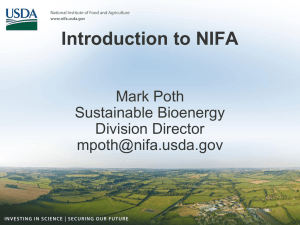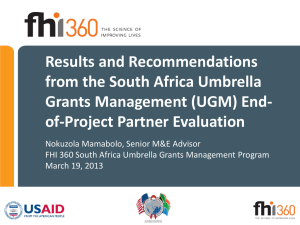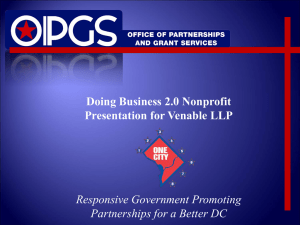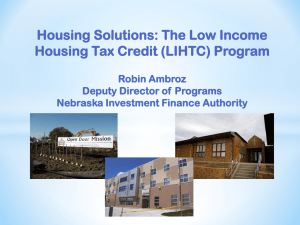(USDA)/National Institute of Food and Agriculture (NIFA)
advertisement
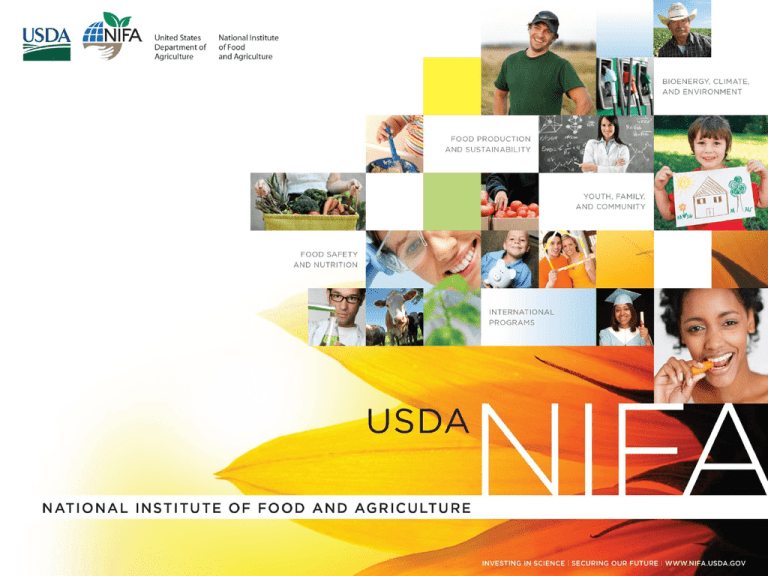
Outline • About our NIFA, • About its programs, • About FY 2013 budget, • About AFRI funding program • How to Increase funding rate on your campus United States Department of Agriculture National Institute of Food and Agriculture NIFA FUNDING INVESTING IN SCIENCE | SECURING OUR FUTURE NIFA FUNDING OPPORTUNITIES FOR HISTORICALLY BLACK COLLEGES AND UNIVERSITIES TOM VILSACK Secretary, USDA DR. CATHERINE WOTEKI DR. SONNY RAMASWAMY Under Secretary, Research, Education, and Economics (REE) and USDA Chief Scientist Director, NIFA NIFA INSTITUTES AND CENTER Institute of Food Production and Sustainability NIFA INSTITUTES AND CENTER Institute of Food Production and Sustainability Institute of Food Safety and Nutrition NIFA INSTITUTES AND CENTER Institute of Food Production and Sustainability Institute of Food Safety and Nutrition Institute of Bioenergy, Climate, and Environment NIFA INSTITUTES AND CENTER Institute of Food Production and Sustainability Institute of Food Safety and Nutrition Institute of Bioenergy, Climate, and Environment Institute of Youth, Family, and Community NIFA INSTITUTES AND CENTER Institute of Food Production and Sustainability Institute of Food Safety and Nutrition Institute of Bioenergy, Climate, and Environment Institute of Youth, Family, and Community Center for International Programs NIFA ORGANIZATION Drivers • National Research Council: - A New Biology for the 21st Century, 2009 - Toward Sustainable Agricultural Systems in the 21st Century, 2010 • Pasteur's Quadrant: Basic Science and Technological Innovation-Stokes FRAMEWORK TO ADVANCE SCIENCE: 1. Focus on a societal challenge (New Biology). 2. Scale work to make a difference through supporting transdisciplinary work—often across disciplines and institutions. 3. Focus + Scale = Impact Focus and scale (combination of fundamental and applied science) result in impact on the societal challenge. SOCIETAL CHALLENGES Food security SOCIETAL CHALLENGES Food security Biofuels/bioproducts SOCIETAL CHALLENGES Food security Biofuels/bioproducts Climate resilient agriculture: o adaptation and o mitigation SOCIETAL CHALLENGES Food security Biofuels/bioproducts Climate resilient agriculture: o adaptation and o mitigation Food safety SOCIETAL CHALLENGES Food security Biofuels/bioproducts Climate resilient agriculture: o adaptation and o mitigation Food safety Nutrition to promote lifelong health Focus on Societal Challenges—Why? Climate Change • Our best science indicates that earth’s climate systems are changing. • 95% probability that there will be an increase of 2-3.5 degrees, as much a 6-10 degrees in arctic regions. • Significant changes to historic patterns in our climate. • Significant implications for our food, fiber, and energy supply; sustainable use of our natural resource base; U.S. security. Focus on Societal Challenges—Why? Bioenergy U.S. addiction to oil undermines U.S. security and economy. Congress has called for production of 36 billion gallons of alternative fuels by 2025. Focus on Societal Challenges—Why? Reduction in Childhood/Adolescent Obesity • 18% of teenage population is obese—30% overweight. • NIH--first generation of Americans in history to have a shorter lifespan than their parents --due to the accumulated effects of obesity and overweight. Focus on Societal Challenges—Why? Food security for a rapidly expanding worldwide population. • Within 30 years World population will reach 9 billion. • In addition to moral/ethical issue, has implications for U.S. security and peaceful relations among countries. • Greatest population growth will occur in areas of world already under food and water availability stress. • Future causes of war likely to be energy, food, water, and religion. Focus on Societal Challenges—Why? Food Safety • Often in the headlines. • ½ of food on American plate comes from off shore sources. • Other countries do not have level of food regulation and inspection that U.S. does. NIFA APPROACH RESEARCH enables us to develop the knowledge needed to solve many of the issues facing our nation NIFA APPROACH RESEARCH enables us to develop the knowledge needed to solve many of the issues facing our nation EDUCATION strengthens schools and universities to train the next generation of scientists, educators, producers, and citizens NIFA APPROACH RESEARCH enables us to develop the knowledge needed to solve many of the issues facing our nation EDUCATION strengthens schools and universities to train the next generation of scientists, educators, producers, and citizens EXTENSION brings the knowledge gained through research and education to the people who need it most—in the United NIFA APPROACH (CONT’D) INTEGRATION brings the three components of the agricultural knowledge system (research, education, and extension) together around a problem area or activity. Integration occurs when the components complement one another and are truly necessary for the ultimate success of the project or program. NIFA HAS MORE THAN 30 DIFFERENT COMPETITIVE PROGRAMS, INCLUDING: Agriculture and Food Research Initiative ($264M) NIFA HAS MORE THAN 30 DIFFERENT COMPETITIVE PROGRAMS, INCLUDING: Agriculture and Food Research Initiative ($264M) Integrated Research, Education, and Extension Water Quality Competitive Grants Program ($25M) NIFA HAS MORE THAN 30 DIFFERENT COMPETITIVE PROGRAMS, INCLUDING: Agriculture and Food Research Initiative ($264M) Integrated Research, Education, and Extension Water Quality Competitive Grants Program ($25M) Specialty Crop Research Initiative ($40M) NIFA HAS MORE THAN 30 DIFFERENT COMPETITIVE PROGRAMS, INCLUDING: Agriculture and Food Research Initiative ($264M) Integrated Research, Education, and Extension Water Quality Competitive Grants Program ($25M) Specialty Crop Research Initiative ($40M) Organic Agriculture Research and Extension Initiative ($25M) • Biotechnology Risk Assessment Program • Risk Management Education Program • Organic Agriculture Research and Extension Initiative • Biomass Research and Development • Beginning Farmers and Ranchers Development Program • Specialty Crop Research Initiative • Small Business Innovation Research • Sustainable Agricultural Research and Education Program Budget Talk Want to take just a moment to talk about the Federal budget, what is currently happening, and what is likely for the future. Consider FY 2013 • Continuing Resolution, first thru March 27, and now through the end of the year. • Sequestration • Rescissions • Farm Bill • The proverbial elephant in the room: the budget deficit. Be thankful we're not getting all the government we're paying for. Will Rogers (1879 - 1935) “Government is like a baby. An alimentary canal with a big appetite at one end and no sense of responsibility at the other.” Ronald Reagan A 2013 Example: Smith-Lever 3(b & c) (in ‘000s) • Budget Authority: $294,000 • After 2.513 % rescission: $286,612 • After 0.2 % rescission: $286,039 • After 5.16 % sequestration: $271,269 • ARE WE DONE YET??? • NO, no, no… 2013 Smith-Lever Example (Cont.) • So, the 2013 appropriation: $271,269 • After assessing NIFA indirect: $264,161 • After assessing SBIR: $264,161 • After assessing BioTech Risk: $264,161 • After peer panel costs: $264,161 • Payment to the States: $264,161 So… • We started with $294,000 and wound up with $264,161 available for the States. • Note that $294,000 is the FY 2012 appropriated amount for this line. • Note also that this amount is the President’s request for 2014. Principles of the 2014 President’s Budget Request • Get back to the 2012 appropriated levels • Consolidate lines • Large increase for Agriculture and Food Research Initiative (AFRI) • Protect minority serving programs The Federal Budget Deficit • One of the driving forces in federal legislation and government execution today. • [Disclaimer: I am not an economist.] Year Billions Pct of GDP 1918 $76 11.86% 1919 $78 16.80% 1942 $162 12.04% 1943 $199 28.05% 1944 $220 22.35% 1945 $223 24.07% 2009 $13,939 10.13% 2010 $14,527 8.90% 2011 $14,959 8.69% 2012 $15,602 8.51% Closing Thought • In recognition of no pay raises for Federal employees for 3 years running, the Director of NIFA announced that NIFA employees can (within reason) now name their own salary. I named mine “Hope” United States Department of Agriculture National Institute of Food and Agriculture AGRICULTURE AND FOOD RESEARCH INITIATIVE (AFRI) FINDING YOUR COMPETITIVE ADVANTAGE AFRI AGRICULTURE AND FOOD RESEARCH INITIATIVE: FINDING YOUR COMPETITIVE ADVANTAGE INVESTING IN SCIENCE | SECURING OUR FUTURE NIFA | INVESTING IN SCIENCE | SECURING OUR FUTURE NIFA FUNDING OPPORTUNITIES FOR HISTORICALLY BLACK COLLEGES AND UNIVERSITIES AGRICULTURE AND FOOD RESEARCH INITIATIVE WHO’S ELIGIBLE? State agricultural experiment stations AGRICULTURE AND FOOD RESEARCH INITIATIVE WHO’S ELIGIBLE? State agricultural experiment stations ALL colleges and universities (including junior colleges offering associate degrees or higher) AGRICULTURE AND FOOD RESEARCH INITIATIVE WHO GETS AFRI GRANTS? LAND GRANT UNIVERSITIES 80% of applications and 75% of grants AGRICULTURE AND FOOD RESEARCH INITIATIVE WHO GETS AFRI GRANTS? LAND GRANT UNIVERSITIES 80% of applications and 75% of grants NON-LAND GRANT PUBLIC UNIVERSITIES 5% of applications and 5% of grants AGRICULTURE AND FOOD RESEARCH INITIATIVE WHO GETS AFRI GRANTS? LAND GRANT UNIVERSITIES 80% of applications and 75% of grants NON-LAND GRANT PUBLIC UNIVERSITIES 5% of applications and 5% of grants PRIVATE COLLEGES/UNIVERSITIES 5% of applications and 7% of grants AGRICULTURE AND FOOD RESEARCH INITIATIVE WHO GETS AFRI GRANTS? LAND GRANT UNIVERSITIES 80% of applications and 75% of grants NON-LAND GRANT PUBLIC UNIVERSITIES 5% of applications and 5% of grants PRIVATE COLLEGES/UNIVERSITIES 5% of applications and 7% of grants PRIVATE RESEARCH ORGANIZATIONS 4% of applications and 4% of grants AGRICULTURE AND FOOD RESEARCH INITIATIVE WHO GETS AFRI GRANTS? LAND GRANT UNIVERSITIES 80% of applications and 75% of grants NON-LAND GRANT PUBLIC UNIVERSITIES 5% of applications and 5% of grants PRIVATE COLLEGES/UNIVERSITIES 5% of applications and 7% of grants PRIVATE RESEARCH ORGANIZATIONS 4% of applications and 4% of grants OTHER (FEDERAL, INDUSTRY, INDIVIDUAL) the balance NOTE: FY2010-12 success rates proportional to applications rates AGRICULTURE AND FOOD RESEARCH INITIATIVE FOUNDATIONAL PROGRAM RFA (EST $70M FY12) Plant health and production and plant products AGRICULTURE AND FOOD RESEARCH INITIATIVE FOUNDATIONAL PROGRAM RFA (EST $70M FY12) Plant health and production and plant products Animal health and production and animal products AGRICULTURE AND FOOD RESEARCH INITIATIVE FOUNDATIONAL PROGRAM RFA (EST $70M FY12) Plant health and production and plant products Animal health and production and animal products Food safety, nutrition, and health AGRICULTURE AND FOOD RESEARCH INITIATIVE FOUNDATIONAL PROGRAM RFA (EST $70M FY12) Plant health and production and plant products Animal health and production and animal products Food safety, nutrition, and health Renewable energy, natural resources, and environment AGRICULTURE AND FOOD RESEARCH INITIATIVE FOUNDATIONAL PROGRAM RFA (EST $70M FY12) Plant health and production and plant products Animal health and production and animal products Food safety, nutrition, and health Renewable energy, natural resources, and environment Agriculture systems and technology AGRICULTURE AND FOOD RESEARCH INITIATIVE FOUNDATIONAL PROGRAM RFA (EST $70M FY12) Plant health and production and plant products Animal health and production and animal products Food safety, nutrition, and health Renewable energy, natural resources, and environment Agriculture systems and technology Agriculture economics and rural communities AGRICULTURE AND FOOD RESEARCH INITIATIVE CHALLENGE AREA RFAS (FUNDING LEVELS TBD) Childhood obesity prevention AGRICULTURE AND FOOD RESEARCH INITIATIVE CHALLENGE AREA RFAS (FUNDING LEVELS TBD) Childhood obesity prevention Climate change AGRICULTURE AND FOOD RESEARCH INITIATIVE CHALLENGE AREA RFAS (FUNDING LEVELS TBD) Childhood obesity prevention Climate change Global food security AGRICULTURE AND FOOD RESEARCH INITIATIVE CHALLENGE AREA RFAS (FUNDING LEVELS TBD) Childhood obesity prevention Climate change Global food security Food safety AGRICULTURE AND FOOD RESEARCH INITIATIVE CHALLENGE AREA RFAS (FUNDING LEVELS TBD) Childhood obesity prevention Climate change Global food security Food safety Sustainable bioenergy NOTE: Challenge Area RFAs include Coordinated Agricultural Projects (CAPs) AGRICULTURE AND FOOD RESEARCH INITIATIVE NIFA FELLOWSHIPS GRANT PROGRAM RFA $6M Offer individual fellowships for pre- and postdoctoral students (NIFA Fellows) AGRICULTURE AND FOOD RESEARCH INITIATIVE NIFA FELLOWSHIPS GRANT PROGRAM RFA $6M Offer individual fellowships for preand postdoctoral students (NIFA Fellows) Focus on the broad challenge areas AGRICULTURE AND FOOD RESEARCH INITIATIVE NIFA FELLOWSHIPS GRANT PROGRAM RFA $6M Offer individual fellowships for pre- and postdoctoral students (NIFA Fellows) Focus on the broad challenge areas We just completed the review Process of the applications AGRICULTURE AND FOOD RESEARCH INITIATIVE LETTERS OF INTENT Required for most program areas AGRICULTURE AND FOOD RESEARCH INITIATIVE LETTERS OF INTENT Required for most program areas Take care to follow guidelines AGRICULTURE AND FOOD RESEARCH INITIATIVE LETTERS OF INTENT Required for most program areas Take care to follow guidelines Applications submitted without a prior Letter of Intent submission will not be reviewed AGRICULTURE AND FOOD RESEARCH INITIATIVE FOOD AND AGRICULTURAL SCIENCE ENHANCEMENT (FASE) GRANTS Pre-doctoral fellowship grants (new) AGRICULTURE AND FOOD RESEARCH INITIATIVE FOOD AND AGRICULTURAL SCIENCE ENHANCEMENT (FASE) GRANTS Pre-doctoral fellowship grants (new) Postdoctoral fellowship grants AGRICULTURE AND FOOD RESEARCH INITIATIVE FOOD AND AGRICULTURAL SCIENCE ENHANCEMENT (FASE) GRANTS Pre-doctoral fellowship grants (new) Postdoctoral fellowship grants New investigator grants (restricted eligibility) AGRICULTURE AND FOOD RESEARCH INITIATIVE FOOD AND AGRICULTURAL SCIENCE ENHANCEMENT (FASE) GRANTS Pre-doctoral fellowship grants (new) Postdoctoral fellowship grants New investigator grants (restricted eligibility) Strengthening grants (restricted eligibility) - sabbatical grants - equipment grants - seed grants - strengthening standard / strengthening CAP grants AGRICULTURE AND FOOD RESEARCH INITIATIVE UNDERSTANDING THE LEVEL OF COMPETITION Programs receive about 100 proposals AGRICULTURE AND FOOD RESEARCH INITIATIVE UNDERSTANDING THE LEVEL OF COMPETITION Programs receive about 100 proposals About 20 projects will be funded AGRICULTURE AND FOOD RESEARCH INITIATIVE UNDERSTANDING THE LEVEL OF COMPETITION Programs receive about 100 proposals About 20 projects will be funded So my chances of getting funded are about 20%? AGRICULTURE AND FOOD RESEARCH INITIATIVE UNDERSTANDING THE LEVEL OF COMPETITION Programs receive about 100 proposals About 20 projects will be funded So my chances of getting funded are about 20%? Not so. Your chances are much higher if you are eligible for the AFRI Food and Agricultural Science Enhancement (FASE) Program AGRICULTURE AND FOOD RESEARCH INITIATIVE FASE STRENGTHENING AWARDS Funded from 7.5% set aside from AFRI appropriation (7.5 of $264M in FY12 is more than $19M) AGRICULTURE AND FOOD RESEARCH INITIATIVE FASE STRENGTHENING AWARDS Funded from 7.5% set aside from AFRI appropriation (7.5 of $264M in FY12 is more than $19M) Eligibility limited to: o EPSCoR states o small to mid-sized institutions (<17,500 enrolled with limited institutional success–not in the top 100) o Minority Serving Institution AGRICULTURE AND FOOD RESEARCH INITIATIVE FASE STRENGTHENING AWARDS Funded from 7.5% set aside from AFRI appropriation (7.5 of $264M in FY12 is more than $19M) Eligibility limited to - EPSCoR states - small to mid-sized institutions (<17,500 enrolled with limited institutional success– not in the top 100) - Minority Serving Institutions Just meet one of these requirements and you are eligible AGRICULTURE AND FOOD RESEARCH INITIATIVE STRENGTHENING AWARD TYPES Standard Strengthening - full research grant $300k to $30M AGRICULTURE AND FOOD RESEARCH INITIATIVE STRENGTHENING AWARD TYPES Standard Strengthening - full research grant $300k to $30M Career Enhancement Award - sabbatical (1 year of salary + travel and supplies) AGRICULTURE AND FOOD RESEARCH INITIATIVE STRENGTHENING AWARD TYPES Standard Strengthening - full research grant $300k to $30M Career Enhancement Award - sabbatical (1 year of salary + travel and supplies) Seed Grants - up to $150k AGRICULTURE AND FOOD RESEARCH INITIATIVE STRENGTHENING AWARD TYPES Standard Strengthening - full research grant $300k to $30M Career Enhancement Award - sabbatical (1 year of salary + travel and supplies) Seed Grants - up to $150k Equipment Grants - the only AFRI grant type requiring a match AGRICULTURE AND FOOD RESEARCH INITIATIVE EQUIPMENT GRANTS Grant limit of $50k - equipment may cost $10 to $250k AGRICULTURE AND FOOD RESEARCH INITIATIVE EQUIPMENT GRANTS Grant limit of $50k - equipment may cost $10 to $250k Match of $1:$1 is required - non-federal match (please note that this is the only type of AFRI grant requiring a match) AGRICULTURE AND FOOD RESEARCH INITIATIVE EQUIPMENT GRANTS Grant limit of $50k - equipment may cost $10 to $250k Match of $1:$1 is required - non-federal match (please note that this is the only type of AFRI grant requiring a match) An opportunity to double your non-federal equipment budget AGRICULTURE AND FOOD RESEARCH INITIATIVE SEED GRANTS Support collection of preliminary data and develop methods and approaches AGRICULTURE AND FOOD RESEARCH INITIATIVE SEED GRANTS Support collection of preliminary data and develop methods and approaches Build a stronger foundation for a standard research proposal AGRICULTURE AND FOOD RESEARCH INITIATIVE SEED GRANTS Support collection of preliminary data and develop methods and approaches Build a stronger foundation for a standard research proposal Award up to $150k AGRICULTURE AND FOOD RESEARCH INITIATIVE CAREER ENHANCEMENT AWARDS Also called Sabbatical Awards AGRICULTURE AND FOOD RESEARCH INITIATIVE CAREER ENHANCEMENT AWARDS Also called Sabbatical Awards Include one year of salary plus travel and supplies ($120k) AGRICULTURE AND FOOD RESEARCH INITIATIVE CAREER ENHANCEMENT AWARDS Also called Sabbatical Awards Include one year of salary plus travel and supplies ($120k) Can be structured and phased so that it is not a year away from your home university AGRICULTURE AND FOOD RESEARCH INITIATIVE CAREER ENHANCEMENT AWARDS Also called Sabbatical Awards Include one year of salary plus travel and supplies ($120k) Can be structured and phased so that it is not a year away from your home university Be creative. Acquire new skills. Forge connections. Expand your horizons. AGRICULTURE AND FOOD RESEARCH INITIATIVE STANDARD STRENGTHENING A regular research or integrated proposal (includes CAPs) AGRICULTURE AND FOOD RESEARCH INITIATIVE STANDARD STRENGTHENING A regular research or integrated proposal (includes CAPs) Proposal has two chances to be funded: AGRICULTURE AND FOOD RESEARCH INITIATIVE STANDARD STRENGTHENING A regular research or integrated proposal (includes CAPs) Proposal has two chances to be funded: - first chance: if the proposal ranks high enough (top 10-15) it is funded out of the regular program funds AGRICULTURE AND FOOD RESEARCH INITIATIVE STANDARD STRENGTHENING A regular research or integrated proposal (includes CAPs) Proposal has two chances to be funded: - first chance: if the proposal ranks high enough (top 10-15) it is funded out of the regular program funds - second chance: from strengthening funds (awards made according to ranking, but of eligible proposals. First eligible proposal may rank substantially below 20.) AGRICULTURE AND FOOD RESEARCH INITIATIVE STRENGTHENING ELIGIBILITY Now eligible in research and integrated programs AGRICULTURE AND FOOD RESEARCH INITIATIVE STRENGTHENING ELIGIBILITY Now eligible in research and integrated programs Now eligible every year in research and integrated programs (not every 5 years as previously set) AGRICULTURE AND FOOD RESEARCH INITIATIVE STRENGTHENING ELIGIBILITY Now eligible in research and integrated programs Now eligible every year in research and integrated programs (not every 5 years as previously set) Now only the lead project director needs to be eligible in research and integrated programs (lead teams that include larger institutions) AGRICULTURE AND FOOD RESEARCH INITIATIVE STRENGTHENING STRATEGY Plan your work to link awards and leverage grants AGRICULTURE AND FOOD RESEARCH INITIATIVE STRENGTHENING STRATEGY Plan your work to link awards and leverage grants Evaluate where you are and what you need o Equipment? (equipment grant) o Training or a collaborator? (sabbatical award) o Preliminary data? (seed grant /sabbatical award) AGRICULTURE AND FOOD RESEARCH INITIATIVE STRENGTHENING STRATEGY Plan your work to link awards and leverage grants Evaluate where you are and what you need - Equipment? (equipment grant) - Training or a collaborator? (sabbatical award) - Preliminary data? (seed grant /sabbatical award) What is your 3-year-plan? - equipment > seed > standard or sabbatical > standard or other AGRICULTURE AND FOOD RESEARCH INITIATIVE STRENGTHENING STRATEGY Plan your work to link awards and leverage grants Evaluate where you are and what you need - Equipment? (equipment grant) - Training or a collaborator? (sabbatical award) - Preliminary data? (seed grant /sabbatical award) What is your 3-year-plan? - equipment > seed > standard or sabbatical > standard or other How will this fit with your unique institutional advantages and strengths? AGRICULTURE AND FOOD RESEARCH INITIATIVE FINDING YOUR COMPETITIVE ADVANTAGE Is the program is asking for only CAP awards? AGRICULTURE AND FOOD RESEARCH INITIATIVE FINDING YOUR COMPETITIVE ADVANTAGE Is the program is asking for only CAP awards? Look closer…for your advantage. AGRICULTURE AND FOOD RESEARCH INITIATIVE FINDING YOUR COMPETITIVE ADVANTAGE Is the program is asking for only CAP awards? Look closer…for your advantage. All programs will take Strengthening Grant applications from MSIs AGRICULTURE AND FOOD RESEARCH INITIATIVE FINDING YOUR COMPETITIVE ADVANTAGE Is the program is asking for only CAP awards? Look closer…for your advantage. All programs will take Strengthening Grant applications from MSIs Includes Equipment, Seed, Sabbatical, and Standard Strengthening (including CAP) grants AGRICULTURE AND FOOD RESEARCH INITIATIVE FINDING YOUR COMPETITIVE ADVANTAGE Is the program is asking for only CAP awards? Look closer…for your advantage. All programs will take Strengthening Grant applications from MSIs Includes Equipment, Seed, Sabbatical, and Standard Strengthening (including CAP) grants Contact the national program leader of your program AGRICULTURE AND FOOD RESEARCH INITIATIVE KEYS TO COMPETITIVE SUCCESS Understand NIFA’s mission AGRICULTURE AND FOOD RESEARCH INITIATIVE KEYS TO COMPETITIVE SUCCESS Understand NIFA’s mission Explore the full range of programs - many options; find your advantage AGRICULTURE AND FOOD RESEARCH INITIATIVE KEYS TO COMPETITIVE SUCCESS Understand NIFA’s mission Explore the full range of programs - many options; find your advantage Communicate with the national program leader(s) in your area of interest AGRICULTURE AND FOOD RESEARCH INITIATIVE KEYS TO COMPETITIVE SUCCESS Understand NIFA’s mission Explore the full range of programs - many options; find your advantage Communicate with the national program leader(s) in your area of interest Participate - Ad hoc reviewer to panelist - Grantsmanship workshops - Applicant to awardee AGRICULTURE AND FOOD RESEARCH INITIATIVE PANEL PARTICIPATION Panelists from minority serving institutions (MSI) are needed AGRICULTURE AND FOOD RESEARCH INITIATIVE PANEL PARTICIPATION Panelists from minority serving institutions (MSI) are needed Faculty from all levels (assistant, associate, and full professor) AGRICULTURE AND FOOD RESEARCH INITIATIVE PANEL PARTICIPATION Panelists from minority serving institutions (MSI) are needed Faculty from all levels (assistant, associate, and full professor) In 2001 less than 2% from MSI; in 2010 7.6% from MSI for AFRI panels AGRICULTURE AND FOOD RESEARCH INITIATIVE PANEL PARTICIPATION Panelists from minority serving institutions (MSI) are needed Faculty from all levels (assistant, associate, and full professor) In 2001 less than 2% from MSI; in 2010 7.6% from MSI for AFRI panels Contact the national program leader listed in the RFA if interested in serving AGRICULTURE AND FOOD RESEARCH INITIATIVE PANEL PARTICIPATION: ADMINISTRATOR’S ROLE Panel is a large workload. There will be about 15 applications to review. This takes most reviewers about 40 hours before panel. AGRICULTURE AND FOOD RESEARCH INITIATIVE PANEL PARTICIPATION: ADMINISTRATOR’S ROLE Panel is a large workload. There will be about 15 applications to review. This takes most reviewers about 40 hours before panel. Administrators must work with faculty to free up this time (release from teaching or other duties) AGRICULTURE AND FOOD RESEARCH INITIATIVE PANEL PARTICIPATION: ADMINISTRATOR’S ROLE Panel is a large workload. There will be about 15 applications to review. This takes most reviewers about 40 hours before panel. Administrators must work with faculty to free up this time (release from teaching or other duties) Panels are on a fixed timeline that may conflict with teaching or other assignments. Administrators must work with faculty to cover assignments while faculty member is in D.C. for the week of the panel. AGRICULTURE AND FOOD RESEARCH INITIATIVE GRANTSMANSHIP WORKSHOPS Provide overview of programs to applicants AGRICULTURE AND FOOD RESEARCH INITIATIVE GRANTSMANSHIP WORKSHOPS Provide overview of programs to applicants Mock peer review panel AGRICULTURE AND FOOD RESEARCH INITIATIVE GRANTSMANSHIP WORKSHOPS Provide overview of programs to applicants Mock peer review panel Face-to-face interaction with national program leaders AGRICULTURE AND FOOD RESEARCH INITIATIVE GRANTSMANSHIP WORKSHOPS Provide overview of programs to applicants Mock peer review panel Face-to-face interaction with national program leaders Tips on grant-writing from experts AGRICULTURE AND FOOD RESEARCH INITIATIVE GRANTSMANSHIP WORKSHOPS Provide overview of programs to applicants Mock peer review panel Face-to-face interaction with national program leaders Tips on grant-writing from experts Travel fellowships for attendees from MSIs AGRICULTURE AND FOOD RESEARCH INITIATIVE GRANTSMANSHIP WORKSHOPS Provide overview of programs to applicants Mock peer review panel Face-to-face interaction with national program leaders Tips on grant-writing from experts Travel fellowships for attendees from MSIs Offered in Washington, D.C. - planning now underway - dates announced on our website; search “grantsmanship” AGRICULTURE AND FOOD RESEARCH INITIATIVE GRANTSMANSHIP WORKSHOPS: YOUR ROLE Structured for faculty who will be preparing applications AGRICULTURE AND FOOD RESEARCH INITIATIVE GRANTSMANSHIP WORKSHOPS: YOUR ROLE Structured for faculty who will be preparing applications Do your homework–check the website for programs of interest and the associated NPL(s) AGRICULTURE AND FOOD RESEARCH INITIATIVE GRANTSMANSHIP WORKSHOPS: YOUR ROLE Structured for faculty who will be preparing applications Do your homework–check the website for programs of interest and the associated NPL(s) Use your time to engage - introduce yourself to NPLs in your areas of interest - offer to serve on a panel (follow up with an email to the NPL with your 2-page CV) - network with others from your region who might team with you in the future on larger applications AGRICULTURE AND FOOD RESEARCH INITIATIVE SUBMITTING APPLICATIONS Begin early AGRICULTURE AND FOOD RESEARCH INITIATIVE SUBMITTING APPLICATIONS Begin early Read the Request for Applications (RFA) AGRICULTURE AND FOOD RESEARCH INITIATIVE SUBMITTING APPLICATIONS Begin early Read the Request for Applications (RFA) Letters of intent may be required before application submission – check dates in the RFA AGRICULTURE AND FOOD RESEARCH INITIATIVE SUBMITTING APPLICATIONS Begin early Read the Request for Applications (RFA) Letters of intent may be required before application submission – check dates in the RFA All applications submitted through Grants.gov AGRICULTURE AND FOOD RESEARCH INITIATIVE SUBMITTING APPLICATIONS Begin early Read the Request for Applications (RFA) Letters of intent may be required before application submission – check dates in the RFA All applications submitted through Grants.gov Work with administrative team at your institution AGRICULTURE AND FOOD RESEARCH INITIATIVE SUBMITTING APPLICATIONS Begin early Read the Request for Applications (RFA) Letters of intent may be required before application submission – check dates in the RFA All applications submitted through Grants.gov Work with administrative team at your institution Late applications are not accepted AGRICULTURE AND FOOD RESEARCH INITIATIVE SUBMITTING APPLICATIONS Begin early Read the Request for Applications (RFA) Letters of intent may be required before application submission – check dates in the RFA All applications submitted through Grants.gov Work with administrative team at your institution Late applications are not accepted Contact NIFA with questions (use contact information in the RFA – not general information from website) Even if you're on the right track, you'll get run over if you just sit there. Will Rogers AGRICULTURE AND FOOD RESEARCH INITIATIVE See the NIFA website for more information: www.nifa.usda.gov Contact Dr. Ali Mohamed, Division Director, Environmental Systems 202-720-5229 amohamed@nifa.usda.gov Questions?

